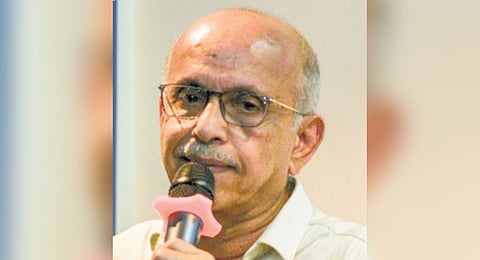

CHENNAI : At least 10 million people in India require palliative care, yet only 4% currently receive it, noted Dr Rajagopal, the founder of Pallium India. Speaking at the second edition of the Keshav Desiraju Memorial Lecture, organised by the Cognizant Foundation in partnership with The Banyan at the Asian College of Journalism, Dr Rajagopal highlighted the implementation gaps in palliative care, despite its inclusion in the National Health Policy in 2017, the MBBS curriculum in 2019, and the BSc Nursing curriculum in 2021.
Saying that there was a need for greater community involvement to address these gaps, he suggested volunteers could play a crucial role in providing much-needed support. He said, “Every clinician should ensure to attend to the patient’s social and emotional suffering, as I deserve to have my suffering treated.”
He pointed out that the pain patients often report is merely the “tip of the iceberg,” with many underlying issues such as physical, social, emotional, financial, spiritual, and general well-being aspects, that doctors alone cannot address. He advocated for the involvement of community support, including volunteers, psychologists, and social workers, to meet these needs.
He also highlighted a 2015 study published in the Indian Medical Journal which revealed that around 55 million Indians are pushed below the poverty line due to catastrophic healthcare expenses. Noting that India is among the 12 worst-affected countries in terms of catastrophic healthcare expenditure, he stressed that the public health sector must be strengthened to address this issue. However, given the significant demand, he said that community-based engagement in palliative care is imperative.
A significant challenge in palliative care is that 93.5% of all available literature on the subject is based on Western data. Reliance on these guidelines often leads to confusion among clinicians as they navigate the gap between established guidelines and the realities.
Dr Soumya Swaminathan, chairperson of MS Swaminathan Research Foundation, recognised Dr Rajagopal as a pioneer in palliative care, emphasising that this field requires empathy and compassion. She highlighted that palliative care involves not only addressing the physical pain of patients but also the other sufferings experienced by both patients and their families.
With medical doctors often not taught about palliative care during their studies, she stressed the importance of changing the wellness and healthcare sectors to address these needs. Vijaya Baskaran, a sign language interpreter, urged the health sector to assign one sign language interpreter in every hospital to assist individuals with hearing and speech impairments.
The lecture was attended by medical professionals among others.